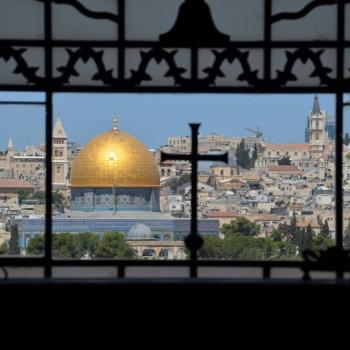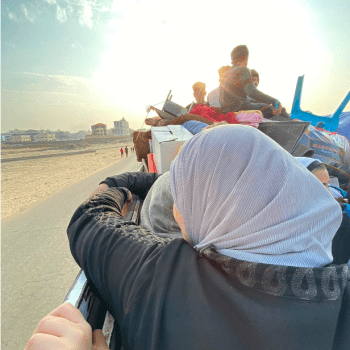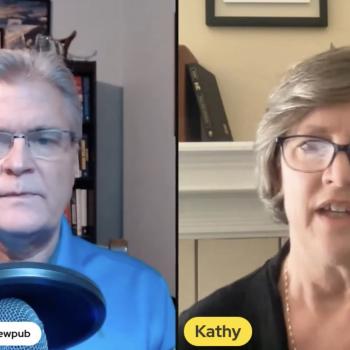During the course of Ramadan, many Muslims read or listen to the whole Qur’an. Here’s how it works – I observed it while living in the Middle East and in the States: many mosques host a tarawiyyeh, a time when the imam (spiritual leader of the congregation) reads aloud from the Qur’an each evening after iftar (the sunset meal that breaks the all-day fast).
It’s planned out so that by the end of the month, the participants will have made their way through the entire book (the whole Qur’an is shorter than our New Testament).
Imagine having a full tummy at last after a long, grueling day of fasting – and then sitting quietly without falling asleep while someone reads to you for a couple of hours. That’s jihad, baby! But what a great discipline, and a great reminder of what a life of faith is about. (Read my whole series on Ramadan for Christians here.)

Holy books
It amazes me when Christians presume to know what is in the Qur’an. I can’t count the number of times I’ve heard the words, “the Qur’an says it’s ok to kill Christians,” or “the Qur’an is all about violence.” Really? Are you sure?
And is the Bible nonviolent? Have you read Exodus? Massacre, poisonous snakes, drowning, plagues. How about Joshua? Massacre, massacre, massacre. We have explanations for these violent passages – and Muslims have explanations for theirs.
We need to stop thinking we know someone else’s holy book better than they do.
And we could stand to get more familiar with our own holy book.
There are lots of things in the New Testament – in the very words of Jesus – that we don’t even know are there!
I went to Sunday School every Sunday of my childhood, and Christian schools from kindergarten through college – and no one ever, ever taught some basic truths that were right in front of us. I’ll tell you about two of them today (I’ve written about them before, here and here).
The Good Samaritan
We’ve all heard the parable of the Good Samaritan, and we were taught that Jesus wants us to be good neighbors. But we were also taught that the only thing that really matters is that before we die, we say a combination of words like, “Please come into my heart and forgive my sins.” Ultimately that’s all that matters.
But is that really what the Good Samaritan is about?
Here’s something I skipped over for more than half a century of Bible reading: before the parable, someone asks Jesus, “What must I do to inherit eternal life?” After the parable, Jesus says, “Go and do likewise” – i.e. “and that’s how to inherit eternal life.”
To put it another way, Jesus said, “You want to inherit eternal life? Ok, live like that Samaritan. Those other guys from the story – the ones who practice your religion – are getting it wrong.”
Or more simply: “Eternal life is not about theology. It’s about love.”
What I’m getting at is that faith in God is not a formula. We Christians (not all of us, but many) have turned it into a formula, contrary to Scripture.
Binary thinking – “my way or the highway” – ignores what God really desires, which is love. Bottom line:
Sometimes, perhaps, people of another faith might be closer to the will of God than people of our own faith.
Sheep and goats
Next stop: the parable of the sheep and goats. Remember? To the sheep, Jesus says, “take your inheritance, the kingdom prepared for you since the creation of the world.”
Who were the sheep? Who inherited the kingdom? The ones who asked Jesus to be Lord of their lives? That’s not what it says.
The ones who cared for “the least of these” inherited the kingdom.
Not the ones who knew the most about sheep, not the ones who memorized the names of all the sheep, or had never made a sheep-related mistake. The ones who loved others.
We have changed Jesus’ message to, “Those who have lived good lives and believed in God will be put on one side and have a place in Heaven,” or “Every unbeliever longs for the food of the Word and the clothing of salvation. Jesus wants us to preach the Gospel. Period.”
That’s not what Jesus said. That’s what we say. I’ll have more examples like this in the coming days. (Are you subscribed to my newsletter?)
I know Jesus said other things like, “I am the Way and the Truth and the Life.” Here’s what I’m getting at: sometimes he said, “I am the Way” and other times he said, “care for the least of these.” The Bible does not give us one single procedure for all people for all time. Finding God is not a straight line or a series of boxes to be checked.
And as the Good Samaritan teaches us – if we dare to learn it – it’s not about rightness or knowledge, but love. Some of the most loving people I know are Muslims, and some of the most hateful I know are Christians.
MORE POSTS YOU MIGHT LIKE TO READ:
Do you know God’s will for you, or just assume you know?
Evangelicals and progressives: let’s dialogue about Jesus and poverty
Dear Conservative Christians: the world is complex and nuanced
“Wait, the Bible says THAT?” Faith that catches Jesus’ attention
FEATURED IMAGE: “Quran 2” by Themeplus is licensed under CC BY-SA 2.0













